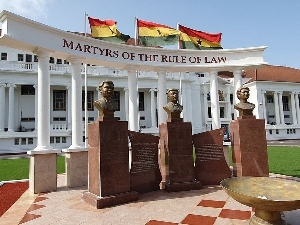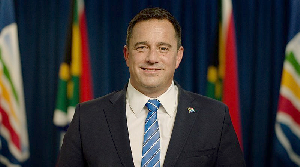Opinions of Thursday, 7 September 2023
Columnist: Evans Mawunyo Tsikata
Where the complainant has turned into the accused?
According to recent press reports, Cecilia Abena Dapaah, Ghana's Minister of Sanitation and Water Resources, allegedly kept over a million dollars in her bedroom while serving as a public officer.
She has so far been unable to explain how she came into possession of this large amount of money, which is the case's astounding aspect.
Additionally, the money that was stolen from her house helps. This situation has given rise to several worries about the potential legal repercussions as well as the consequences for the engaged public official.
It is incredibly astonishing that some politicians are faring so well given the situation at hand at this trying time. Even if money is scarce, they have more than enough. Is this the reason why politicians invest so much money to get an office? The minister recently resigned in the wake of considerable public outcry.
However, given the situation, that was the right thing to do. Regrettably, our leaders in Ghana find it so challenging to behave in such a way even in worse situations.
I think it's important for those in positions of leadership to always be open and honest, even if we shouldn't detract from the stealing aspect by talking about where the money comes from. What motivates someone to hold over a million dollars in their bedroom for close to a year when the government was chasing people who were hoarding dollars a few months ago as a result of the dollar hike?
Given the large sum of money involved and the public officer's inability to explain its origin, an investigation into the source of the money needs to be undertaken. This investigation would almost definitely involve the Office of Special Prosecutor (OSP), the Police, the Economic and Organized Crime Office (EOCO), or the Commission on Human Rights and Administrative Justice (CHRAJ).
If the funds are discovered to be the proceeds of unlawful operations, or if money laundering allegations exist, the minister may face money laundering charges. Money laundering is a crime punishable by imprisonment, fines, or both under the Anti-Money Laundering Act, of 2008 (Act 749). Money laundering is the act of concealing or concealing the origins of unlawfully obtained funds, generally through a complex series of banking transfers or commercial transactions. If it is discovered that the minister obtained the cash illegally, she may be charged with money laundering.
If the public officer is unable to provide a satisfactory explanation for the source of the money, they may face corruption charges. This could include bribery, embezzlement, or abuse of office allegations, among other things. The penalties for these acts are severe under the Criminal Offences Act of 1960 (Act 29) and the Public Financial Management Act of 2016 (Act 921). If the money is shown to be illegitimate or unlawful, the public officer may face prosecution for illegally possessing cash. The Narcotics Control Board Act of 1990 (PNDC Law 236) and other pertinent legislation make this an offense.
In Ghana, public officers are required by law to declare their assets, including any considerable sums of money they own. If the public officer neglected to declare this large sum of money, she could face legal consequences for violating asset declaration requirements. Legal action may be taken against her for failing to report her assets, which might result in penalties and potential sanctions.
If mismanagement is alleged, she may face legal consequences as a public official in charge of public finances. The fact that she kept such a large sum of money in her bedroom without proper responsibility throws her financial stewardship and compliance into serious doubt. Depending on the outcome of the investigation, she may face prosecution for financial mismanagement and breach of fiduciary duty.
Finally, as per Sections 23,120,124,125,147 of the Criminal Offences Act of 1960 (Act 29), those who stole the money and their accomplices, particularly the housekeepers, would face criminal charges for the stealing. In Ghana, the legal consequences of stealing are sometimes dictated by the value of the stolen object, and the reported amount in this case would almost surely result in heavy punishment for those found responsible.
A fascinating element of the issue that most people had not given much thought to was the 18-year-old housekeeper. The girl is now 18 years old. As a result, when the minister employed her, she was under the age of 18. A deal with a minor that is neither necessary nor beneficial is morally wrong for a person of her caliber. When these children are supposed to be in school.
In effect, the minister's decision to keep a large amount of money in her bedroom without revealing how she got it has serious legal consequences. Money laundering and corruption may be charged, failing to comply with asset declaration requirements and financial mismanagement as well as her Tax obligations. Furthermore, the housekeepers who participated in stealing with their accomplices will face criminal prosecution.
The Ghanaian court system will have a significant impact on the outcomes and appropriate punishments for those involved in this difficult and contentious case. Articles 35(8), 41(f), 218, 286, and 287 of Ghana's 1992 Constitution have several provisions that aim to criminalize and punish corrupt practices. The person should, however, be given a fair hearing first, as required by the natural justice norm.
Ghana’s leading digital news platform, GhanaWeb, in conjunction with the Korle-Bu Teaching Hospital, is embarking on an aggressive campaign which is geared towards ensuring that parliament passes comprehensive legislation to guide organ harvesting, organ donation, and organ transplantation in the country.
Click here to start the nomination process for the 2023 GhanaWeb Excellence Awards













